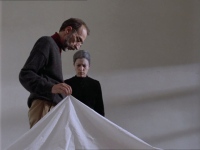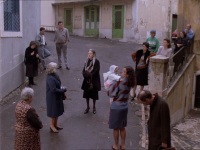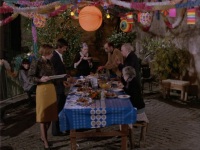Recollections of the Yellow House
05/16/2010
Portugal / 1989 / Portuguese
Directed by João César Monteiro
With João César Monteiro, Manuela de Freitas, Teresa Calado
 Recollections of the Yellow House is the first in a cycle of films in which Portuguese director João César Monteiro stars as his alter-ego, the quietly lecherous João de Deus, who inhabits a tiny, spartan room in the boarding house of the title. As the film opens he speaks poetically of the bedbugs that torment him and the pain in his testicles, over a shot of Lisbon’s harbor. As the camera drifts further out to sea, we are drawn closer into the squalid minutiae and prosaic miseries of his alienated existence. The landlady of the house, the austere Dona Violeta, meets him with both sympathy and veiled hostility.
Recollections of the Yellow House is the first in a cycle of films in which Portuguese director João César Monteiro stars as his alter-ego, the quietly lecherous João de Deus, who inhabits a tiny, spartan room in the boarding house of the title. As the film opens he speaks poetically of the bedbugs that torment him and the pain in his testicles, over a shot of Lisbon’s harbor. As the camera drifts further out to sea, we are drawn closer into the squalid minutiae and prosaic miseries of his alienated existence. The landlady of the house, the austere Dona Violeta, meets him with both sympathy and veiled hostility.
Meanwhile he lusts after her daughter Julieta, a young woman who has just entered the police force as a secretary, and whom he sees in shy glimpses across the hall and watches through keyholes. Through the old man’s studied obsession with her, he inches closer in vain hope. Otherwise he scrapes by even with no steady income, skinny and barely there, and generally suffers from the frustrations of a misogynist living under the iron fist of a controlling and nurturing woman, Dona Violeta. On the narrow and cobbled streets of Lisbon he spends his days obtaining cigarettes, and when he confesses to his doctor that he often forgets to eat, he is unsurprisingly diagnosed with a vitamin deficiency.
When a Brazilian immigrant, a forlorn and desultory fellow boarder who works as a prostitute, seeks physical solace with him, he is unrepentantly blasé about the encounter. One is reminded of the at once abusive and improbably congratulatory treatment through which Woody Allen puts his autobiographical characters. João de Deus, who shares his name with both a revered saint and a treasured poet, is a portrait of docile and fatalistic reserve. He limps delicately through crowds, engaging in some manner of comic, leaden observation, reproducing Tati’s guileless Msr. Hulot character with only the self-absorption and middle-aged qualities intact, and none of the childlike. And yet below the surface, and away from the watchful eye of the landlady, he feeds his hungers, those which are socially unacceptable, caught-at, too indulgent to reveal.
 João tries to prove to Dona Violeta that the bedbugs are a reality, but can’t produce visible evidence, besides the sores on his body. The points of human contact that focus his lust for the woman’s daughter tend to be the most ephemeral and barely visible ones. He drinks Julieta’s sudsy shower water, and saves from the drain one of her pubic hairs, which becomes almost a religious object. It could be said that, when it comes to Julieta, the old man is fixating on, inventing, that which he cannot, in fact, see in her whatever: pretense, pettiness, dishonesty. The sound of her rehearsing for the policeman’s orchestra is heard throughout the house. To João, her clarinet is clarion. And yet we have no clue as to the meaning of all of this. Although his character’s face is in nearly every scene, Monteiro keeps him a shadowy figure whose private idealization is hidden from view, not externalized in any way. He is not simply a pervert locked in a world of desires, but a fastidious entomologist seeking a perfect specimen, an insect himself pinned to his own voyeuristic corkboard.
João tries to prove to Dona Violeta that the bedbugs are a reality, but can’t produce visible evidence, besides the sores on his body. The points of human contact that focus his lust for the woman’s daughter tend to be the most ephemeral and barely visible ones. He drinks Julieta’s sudsy shower water, and saves from the drain one of her pubic hairs, which becomes almost a religious object. It could be said that, when it comes to Julieta, the old man is fixating on, inventing, that which he cannot, in fact, see in her whatever: pretense, pettiness, dishonesty. The sound of her rehearsing for the policeman’s orchestra is heard throughout the house. To João, her clarinet is clarion. And yet we have no clue as to the meaning of all of this. Although his character’s face is in nearly every scene, Monteiro keeps him a shadowy figure whose private idealization is hidden from view, not externalized in any way. He is not simply a pervert locked in a world of desires, but a fastidious entomologist seeking a perfect specimen, an insect himself pinned to his own voyeuristic corkboard.
In the absence of fantasy projected forth from the protagonist, the story itself becomes more fantastical. Like Kiarostami, Monteiro delights, in a late segment of the film, in gleefully laying waste to all that has come before. The character’s acrimonious exit from the house, just as he seems to have gained a semblance of legitimacy in the eyes of the other characters, is both a loud declaration of his personality, with all of his psychological flaws and deformities, and a confirmation of what they had all thought of him from the start. The neighborhood women, gossiping from windows that would seem to be a fixture of urban life in Southern Europe, mock his effeminacy and question his sexual potency. He becomes a sort of monster, a folk legend, at one point assuming the posture and visual persona of Count Orlok from Nosferatu (1922). This is a bold and unabashed rethinking of the innocence of a frail and mostly powerless older man cosseting sexual fascination with youth from the window of his own thoughts. Disgusted, society banishes him, quite memorably to the same panoptic asylum where António Reis filmed Jaime (1974). Instead of merely disappearing within its radial cells, de Deus runs furiously around the circular courtyard, making of the building a sort of nickelodeon.
 There is an overriding sense that there is a basic transgression, even hostility that underlies de Deus’ preoccupation with the sensory, and his florid, avuncular come-ons to young ladies. However, the essential reality of his obsession is identifiable, even pitiable; through Julieta, he wants to transcend his meager existence, sick body, and the equally decrepit netherworld that both inhabit within the film, which is nearly void of references to contemporary culture, and characterized by both purple obscenity and a minute preciousness. And when reality sets in, it pulls the character from grim stasis, supplanting both anguish and elation, and wiping the slate clean, sitcom-style. At this point the film ceases to be recollection and enters a mode of poetic realization, the idyll being gone, none of the artifice in his life worth grasping any longer. When the character degrades and falls by the wayside, his indiscretions essentially forgiven, he is turned loose, no doubt to seek another yellow house with its bedbugs and cloistered trappings, all over again.
There is an overriding sense that there is a basic transgression, even hostility that underlies de Deus’ preoccupation with the sensory, and his florid, avuncular come-ons to young ladies. However, the essential reality of his obsession is identifiable, even pitiable; through Julieta, he wants to transcend his meager existence, sick body, and the equally decrepit netherworld that both inhabit within the film, which is nearly void of references to contemporary culture, and characterized by both purple obscenity and a minute preciousness. And when reality sets in, it pulls the character from grim stasis, supplanting both anguish and elation, and wiping the slate clean, sitcom-style. At this point the film ceases to be recollection and enters a mode of poetic realization, the idyll being gone, none of the artifice in his life worth grasping any longer. When the character degrades and falls by the wayside, his indiscretions essentially forgiven, he is turned loose, no doubt to seek another yellow house with its bedbugs and cloistered trappings, all over again.
This is a wonderful review of a film I saw at the Gothenburg film festival in, I think, 1996, and which has lodged in my memory ever since.
PS. Thank you!